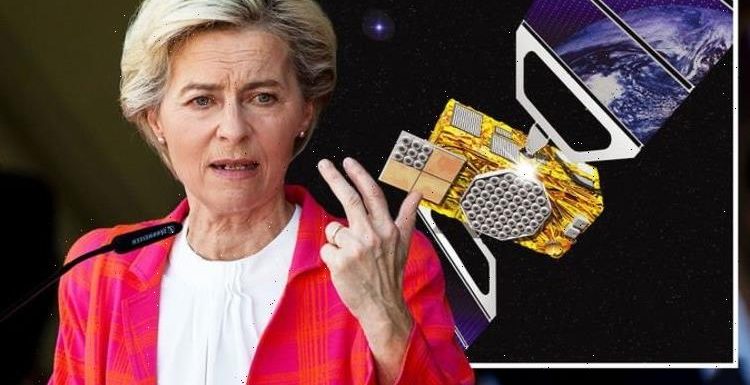
Galileo: David Morris outlines UK’s role in project
We use your sign-up to provide content in ways you’ve consented to and to improve our understanding of you. This may include adverts from us and 3rd parties based on our understanding. You can unsubscribe at any time. More info
The UK’s historic exit from the European Union marked an end to Britain’s involvement in Europe’s premier satellite navigation system. Despite sinking more than £1.2billion into the project, Brexit Britain decided to go its own way with former Prime Minister Theresa May saying it was time to look for “alternatives”. The Government has since invested an impressive £364million ($500million) to acquire the satellite company OneWeb from bankruptcy, in conjunction with the Indian company Bharti Global, with the aim of building a world-class constellation of satellites in low-Earth orbit (LEO).
And though it may appear as though the question of British access to Galileo has long been swept under the rug, the EU may have had a change of heart.
According to Timo Pesonen, head of the Directorate-General for Defence Industry and Space of the European Commission, the doors are still open for the UK to collaborate with the EU.
The EU has not extended a formal invitation to rejoin the project, but officials appear ready to resume negotiations – five years on since the Brexit referendum.
Speaking in June, Mr Pesonen told a briefing in Brussels: “The European Union is open to negotiate with the UK on its participation in the EU space programmes. The ball is in London, not here.”


He added: “On Galileo, the European Union remains open to negotiate a PRS access agreement but, so far, the UK has expressed any interest.”
The Galileo Public Regulated Service or PRS is an encrypted navigation signal that runs alongside Galileo’s public service but is made readily available to emergency services among others.
The PRS signal is encrypted and harder to tamper with or jam, making it the right tool for the job for police, coastguard services, fire brigades and search and rescue operations.
The signal is available to all EU Member States only, but concessions have been made to allow non-EU states access.
Brexit: Expert discusses future of Galileo space project
Deals have been struck between the EU and Norway and Switzerland, so it would not be impossible for the UK to secure a deal as well.
However, following the Brexit vote, the UK opted to invest £92million ($127million) into an 18-month-study of a UK Global Navigation System (GNSS).
The plans were ultimately scrapped last year, with the Government instead focusing on the Space-Based Positioning Navigation and Timing Programme.
Launched by the UK Space Agency in October 2020, the initiative would explore “innovative ways of delivering vital satellite navigation” to the UK from space.


In May this year, the Government announced the UK space sector has won more than £2million worth of investment to help bolster the nation’s presence in space with position, navigation and timing (PNT) services.
In total, six UK businesses were selected to receive Government funding.
Ian Annett, Deputy CEO of the UK Space Agency, said: “The UK is critically dependant on position, navigation and timing information from satellite navigation systems in transport, communications, energy distribution, and emergency response.
“The initial funding will help us design options for a new system to support our critical national infrastructure, whilst growing the space sector, boosting economic growth and making daily life more secure for people everywhere in the UK.”
Earlier this month it was revealed an ambitious project between OneWeb and Airbus was tipped to “rival” Galileo.
The news followed Prime Minister Boris Johnson opening a £35million satellite plant at Airbus Stevenage.
OneWeb has partnered with Airbus to manufacture the rollout of the remainder of the 650 satellites that will form its LEO constellation.
To date, the company has already launched 288 satellites, with the latest launch on August 21 from the Baikonur Cosmodrome in Kazakhstan.
Source: Read Full Article